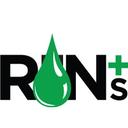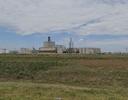Biofuels Isoconversion demonstration system deemed a success

March 31, 2014
BY Applied Research Associates
This week, Blue Sun Energy, Applied Research Associates Inc., and Chevron Lummus Global achieved a key development milestone with their 100 barrel per day (4,200 gallons per day) demonstration-scale Biofuels Isoconversion facility in St. Joseph, Mo. Less than a year after beginning engineering to scale the technology, the team has completed plant commissioning and has begun 24/7 system operation.
“This is a key milestone toward commercial scale production, with initial results showing comparable system performance in the scale-up from our 4 barrel a day pilot system in Panama City, Fla., to the 100 BBL a day demonstration system in St Joseph,” said Rob Sues, CEO of ARA.
The Biofuels Isoconversion process seamlessly processes renewable feedstocks such as plant oils, tallow, and waste vegetable oil into 100 percent drop-in diesel and jet fuels, which meet petroleum specs without blending, as well as naphtha that can be used as a gasoline blend stock.
Advertisement
“Operation of the demonstration system is critical in terms of scaling the process and technology and garnering the insights and experience needed to begin construction on our first commercial facility, which will truly be a landmark for the emerging next-generation biofuels industry,” said Leigh Freeman, CEO of Blue Sun.
The team will continue to test the system with various feedstocks, including the tradermarked Resonance, an industrial oil feedstock from Agrisoma Biosciences, as well as fatty acid distillate, distillers corn oil, and tallow to ensure reliable and cost effective operation. The demonstration system will be operated in campaigns to produce tens of thousands of gallons of jet fuel and diesel for certification testing, endurance testing, and test flights through the end of this year.
“We are enthusiastic about the early success that Blue Sun, Chevron Lummus Global, and ARA have achieved at the demonstration facility in St. Joseph,” said Leon DeBruyn, managing director of Chevron Lummus Global. “Production of completely fungible jet and diesel fuels from renewable industrial oils and waste oils is a game changer.”
Advertisement
The Biofuel Isoconversion process consists of:
-ARA’s Catalytic Hydrothermolysis process, which mimics nature’s way of converting biomass to petroleum crude. While nature’s processes take millennia to produce petroleum crude, it takes less than a minute for the CH process to turn plant oils into a high-quality crude oil intermediate. A U.S. patent was granted to ARA in 2010 on the CH process.
-CLG’s Isoconversion catalysts efficiently upgrade the crude oil intermediate produced by the CH reactor into on-specification, finished fuels. The final products are all fungible and nearly identical to petroleum-derived fuels. ReadiJet and ReadiDiesel can be tailored to meet all commercial and military jet fuel specifications.
Related Stories
Biodiesel capacity in the U.S. and Canada dipped slightly stable in 2024, with several renewable diesel producers reporting headwinds and lower margins alongside a drove of SAF projects in various stages of development.
The IEA’s Task 39 group has new research regarding the development and status of the sustainable aviation fuel industry.
The U.S. EPA on Nov. 16 released updated RIN data, reporting that nearly 2.11 billion RINs were generated under the RFS in October, up from 1.81 billion generated during the same month of last year.
Conestoga to host SAFFiRE cellulosic ethanol pilot plant
Conestoga Energy and SAFFiRE Renewables LLC announced on Nov. 16 their agreement for Conestoga to host SAFFiRE’s cellulosic ethanol pilot plant at Conestoga’s Arkalon Energy ethanol facility in Liberal, Kansas.
Officials at Calumet Specialty Products Partners L.P. discussed the company’s proposed plans to boost sustainable aviation fuel (SAF) production at its Montana Renewables biorefinery during third quarter earnings call, held Nov. 9.
Upcoming Events










